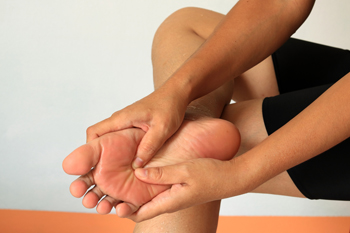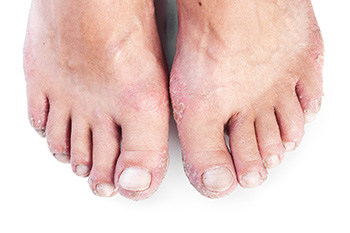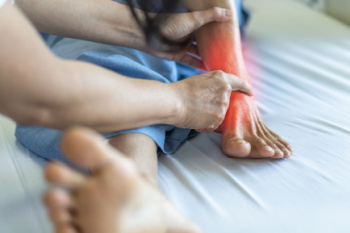Connect With Us
Blog
Items filtered by date: May 2024
Are You Suffering From Ingrown Toenails?
Complications of Peripheral Neuropathy
 Peripheral neuropathy results from damage to the peripheral nerves, which are responsible for sending information from the brain and spinal cord to the rest of the body. This condition often results in tingling, numbness, and pain in the affected areas, typically the hands and feet. Due to high blood sugar levels common in diabetes, people with this disease are more prone to peripheral neuropathy and the associated lack of sensation in the feet. This loss of feeling means that injuries, pressure sores, or other foot problems may go unnoticed. Without prompt and proper care, such untreated injuries can develop into diabetic foot ulcers, serious wounds that heal very slowly due to impaired circulation. If these ulcers become infected and treatment is not working, the ulcer can progress to gangrene, which involves the death of body tissue. This sometimes necessitates amputation to prevent further health complications. Regular check-ups with a podiatrist, or foot doctor, can help manage peripheral neuropathy and prevent severe complications. If you have peripheral neuropathy, it is suggested that you add a podiatrist to your regular care team.
Peripheral neuropathy results from damage to the peripheral nerves, which are responsible for sending information from the brain and spinal cord to the rest of the body. This condition often results in tingling, numbness, and pain in the affected areas, typically the hands and feet. Due to high blood sugar levels common in diabetes, people with this disease are more prone to peripheral neuropathy and the associated lack of sensation in the feet. This loss of feeling means that injuries, pressure sores, or other foot problems may go unnoticed. Without prompt and proper care, such untreated injuries can develop into diabetic foot ulcers, serious wounds that heal very slowly due to impaired circulation. If these ulcers become infected and treatment is not working, the ulcer can progress to gangrene, which involves the death of body tissue. This sometimes necessitates amputation to prevent further health complications. Regular check-ups with a podiatrist, or foot doctor, can help manage peripheral neuropathy and prevent severe complications. If you have peripheral neuropathy, it is suggested that you add a podiatrist to your regular care team.
Neuropathy
Neuropathy can be a potentially serious condition, especially if it is left undiagnosed. If you have any concerns that you may be experiencing nerve loss in your feet, consult with Imaze Marian Davis, DPM from Marian Davis, DPM, PA. Our doctors will assess your condition and provide you with quality foot and ankle treatment for neuropathy.
What Is Neuropathy?
Neuropathy is a condition that leads to damage to the nerves in the body. Peripheral neuropathy, or neuropathy that affects your peripheral nervous system, usually occurs in the feet. Neuropathy can be triggered by a number of different causes. Such causes include diabetes, infections, cancers, disorders, and toxic substances.
Symptoms of Neuropathy Include:
- Numbness
- Sensation loss
- Prickling and tingling sensations
- Throbbing, freezing, burning pains
- Muscle weakness
Those with diabetes are at serious risk due to being unable to feel an ulcer on their feet. Diabetics usually also suffer from poor blood circulation. This can lead to the wound not healing, infections occurring, and the limb may have to be amputated.
Treatment
To treat neuropathy in the foot, podiatrists will first diagnose the cause of the neuropathy. Figuring out the underlying cause of the neuropathy will allow the podiatrist to prescribe the best treatment, whether it be caused by diabetes, toxic substance exposure, infection, etc. If the nerve has not died, then it’s possible that sensation may be able to return to the foot.
Pain medication may be issued for pain. Electrical nerve stimulation can be used to stimulate nerves. If the neuropathy is caused from pressure on the nerves, then surgery may be necessary.
If you have any questions, please feel free to contact our office located in Miami, FL . We offer the newest diagnostic and treatment technologies for all your foot care needs.
Is It Foot Fungus or Psoriasis?

Deciphering whether you have an athlete’s foot infection or psoriasis on the feet can be difficult. Understanding the symptoms can help. Athlete’s foot, a contagious fungal infection thriving in warm, moist environments, typically appears as red, scaly patches between toes or under nails. It may cause itching and discomfort if untreated. On the other hand, psoriasis, an autoimmune disorder, manifests with similar symptoms but is not contagious. Psoriasis lesions may cause silvery scales and vary in color over time. They often involve the soles and nails, causing soreness or tenderness. Nail changes, like pitting or discoloration, are common in psoriasis. While athlete’s foot primarily itches, psoriasis can lead to joint stiffness in addition to discomfort. Treatment approaches also differ. Athlete's foot is usually treated with antifungal medications, while psoriasis management may involve topical treatments, light therapy, or systemic medications. If you have a type of rash on your feet, it is suggested that you schedule an appointment with a podiatrist for a proper diagnosis and appropriate treatment.
Everyday foot care is very important to prevent infection and other foot ailments. If you need your feet checked, contact Imaze Marian Davis, DPM from Marian Davis, DPM, PA. Our doctors can provide the care you need to keep you pain-free and on your feet.
Everyday Foot Care
Often, people take care of their bodies, face and hair more so than they do for their feet. But the feet are a very important aspect of our bodies, and one that we should pay more attention to. Without our feet, we would not be able to perform most daily tasks.
It is best to check your feet regularly to make sure there are no new bruises or cuts that you may not have noticed before. For dry feet, moisturizer can easily be a remedy and can be applied as often as necessary to the affected areas. Wearing shoes that fit well can also help you maintain good foot health, as well as making it easier to walk and do daily activities without the stress or pain of ill-fitting shoes, high heels, or even flip flops. Wearing clean socks with closed shoes is important to ensure that sweat and bacteria do not accumulate within the shoe. Clean socks help to prevent Athlete’s foot, fungi problems, bad odors, and can absorb sweat.
If you have any questions please feel free to contact our office located in Miami, FL . We offer the newest diagnostic and treatment technologies for all your foot and ankle needs.
What Is Tarsal Tunnel Syndrome?

Tarsal tunnel syndrome is a condition affecting the tibial nerve as it passes through the tarsal tunnel, located on the inside of the ankle. It primarily affects individuals who engage in repetitive activities or have deformities, such as flat feet. The syndrome occurs when the nerve becomes compressed, leading to symptoms like tingling, burning sensations, numbness, or shooting pain along the inner ankle and sole of the foot. Diagnosis generally involves a physical examination, medical history review, and possibly nerve conduction studies or imaging tests to confirm the compression. If you have symptoms of tarsal tunnel syndrome, it is suggested that you schedule an appointment with a podiatrist for a proper diagnosis and treatment. This type of healthcare professional can help you manage the condition by suggesting conservative treatments first. In severe cases, surgical intervention may be necessary to relieve pressure on the nerve and alleviate symptoms, restoring comfort and function to the affected foot.
Tarsal tunnel syndrome can be very uncomfortable to live with. If you are experiencing tarsal tunnel syndrome, contact Imaze Marian Davis, DPM of Marian Davis, DPM, PA. Our doctors can provide the care you need to keep you pain-free and on your feet.
Tarsal Tunnel Syndrome
Tarsal tunnel syndrome, which can also be called tibial nerve dysfunction, is an uncommon condition of misfiring peripheral nerves in the foot. The tibial nerve is the peripheral nerve in the leg responsible for sensation and movement of the foot and calf muscles. In tarsal tunnel syndrome, the tibial nerve is damaged, causing problems with movement and feeling in the foot of the affected leg.
Common Cause of Tarsal Tunnel Syndrome
- Involves pressure or an injury, direct pressure on the tibial nerve for an extended period of time, sometimes caused by other body structures close by or near the knee.
- Diseases that damage nerves, including diabetes, may cause tarsal tunnel syndrome.
- At times, tarsal tunnel syndrome can appear without an obvious cause in some cases.
The Effects of Tarsal Tunnel Syndrome
- Different sensations, an afflicted person may experience pain, tingling, burning or other unusual sensations in the foot of the affected leg.
- The foot muscles, toes and ankle become weaker, and curling your toes or flexing your foot can become difficult.
- If condition worsens, infections and ulcers may develop on the foot that is experiencing the syndrome.
A physical exam of the leg can help identify the presence of tarsal tunnel syndrome. Medical tests, such as a nerve biopsy, are also used to diagnose the condition. Patients may receive physical therapy and prescriptive medication. In extreme cases, some may require surgery.
If you have any questions please feel free to contact our office located in Miami, FL . We offer the newest diagnostic and treatment technologies for all your foot and ankle needs.
Wearing Proper Footwear in Healthcare Work Environments

Wearing appropriate footwear in healthcare settings holds immense importance, impacting the well-being of healthcare professionals and the quality of patient care. Healthcare environments are dynamic and demanding, requiring individuals to be on their feet for extended periods. Proper footwear provides essential support, stability, and protection against workplace hazards such as spills, sharp objects, and potential exposure to biological hazards. Additionally, wearing quality footwear plays an essential role in preventing foot fatigue, discomfort, and musculoskeletal injuries commonly associated with prolonged standing or walking. Furthermore, wearing closed-toe shoes with slip-resistant soles reduces the risk of slips, trips, and falls, promoting a safer working environment for staff and patients. By prioritizing the selection of appropriate footwear, healthcare professionals can enhance their comfort, productivity, and overall well-being, ensuring they can focus on delivering optimal care to those in need while minimizing the risk of workplace-related injuries. If you have foot pain while working, contact a podiatrist who can treat foot conditions and guide you toward the right shoe choices for your working day.
While working on the feet, it is important to take the proper care of them. For more information about working on your feet, contact Imaze Marian Davis, DPM from Marian Davis, DPM, PA. Our doctors will treat your foot and ankle needs.
Working on Your Feet
Standing on your feet for long periods of time can cause stress and pain in your feet. Your whole body may experience change in terms of posture, back pain, bunions, callouses and or plantar warts. There are ways to avoid these conditions with proper foot care, smart choices and correct posture.
Positive Changes
Negative heeled shoe – Choosing this shoe type places the heel slightly lower than the ball of the foot. These are great for overall foot health. Find shoes that fit you correctly.
Go barefoot – Our feet were not designed to be enclosed for all hours of the day. Try to periodically expose your feet to air.
Eliminate Pain
Foot Exercises – Performing simple exercises, incorporating yoga and doing stretches are beneficial. This will allow increased blood flow to the area and muscles of the foot.
Achilles tendon – Stretching the foot out flat on the floor will relax the calf muscles and tendon. These exercises can be performed almost anywhere. Make sure you add these exercises to your daily regimen.
With a little bit of this information and knowing more about foot health, you will notice changes. Foot stretches and proper footwear will help with pain and prevent further issues.
If you have any questions please feel free to contact our office located in Miami, FL . We offer the newest diagnostic and treatment technologies for all your foot and ankle needs.


